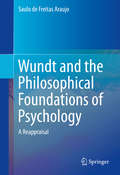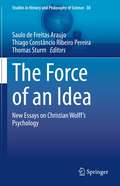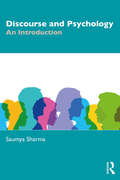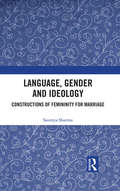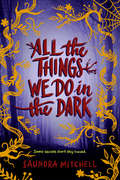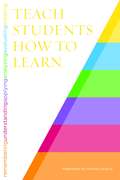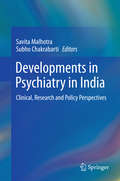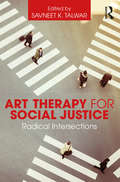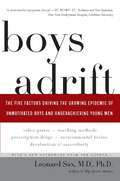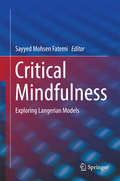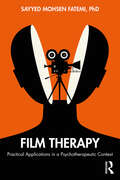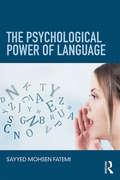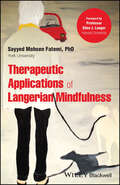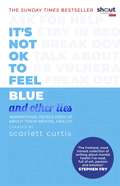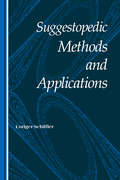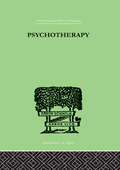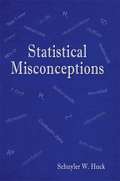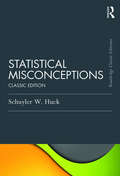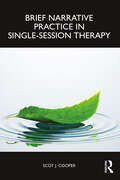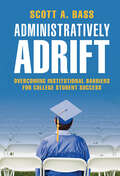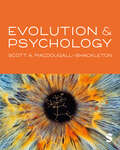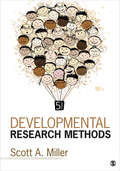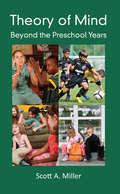- Table View
- List View
Wundt and the Philosophical Foundations of Psychology
by Saulo Freitas AraujoThis book reassesses the seminal work of Wilhelm Wundt bydiscussing the history and philosophy of psychology. It traces the pioneeringtheorist's intellectual development and the evolution of psychology throughouthis career. The author draws on little-known sources to situate psychologicalconcepts in Wundt's philosophical thought and address common myths andmisconceptions relating to Wundt's ideas. The ideas presented in this book showwhy Wundt's work remains relevant in this era of ongoing mind/brain debate and interestcontinues in the links between psychology and philosophy. Featured topics include: Theoretical and philosophical foundations of Wundt's early work in scientific psychology. Wundt's conception of scientific philosophy in relation to his theory of knowledge. The epistemological dimensions of Wundt's final project in scientific psychology. Wundt and thePhilosophical Foundations of Psychology is a valuable resource for researchers,professors, and graduate students in cognitive and related psychology andphilosophy disciplines.
The Force of an Idea: New Essays on Christian Wolff's Psychology (Studies in History and Philosophy of Science #50)
by Thomas Sturm Saulo de Freitas Araujo Thiago Constâncio Ribeiro PereiraThis book presents, for the first time in English, a comprehensive anthology of essays on Christian Wolff's psychology written by leading international scholars. Christian Wolff is one of the towering figures in 18th-century Western thought. In the last decades, the publication of Wolff's Gesammelte Werke by Jean École and collaborators has aroused new interest in his ideas, but the meaning, scope, and impact of his psychological program have remained open to close and comprehensive analysis and discussion. That is what this volume aims to do. This is the first volume in English completely devoted to Wolff's efforts to systematize empirical and rational psychology, against the background of his understanding of scientific method in metaphysics. Wolff thereby paved the way to the very idea of a scientific psychology. The book is divided into two parts. The first one covers the theoretical and historical meaning and scope of Wolff's psychology, both in its internal structure and in its relation to other parts of his philosophical system, such as logic, cosmology, aesthetics, or practical philosophy. The second part deals with the reception and impact of Wolff's psychology, starting with early reactions from his disciples and opponents, and moving on to Kant, Hegel, and Wundt. The Force of an Idea: New Essays on Christian Wolff's Psychology shows not only that Wolff's psychological ideas have been misinterpreted, but also that they are historically more significant than traditional wisdom has it. The book, therefore, will be of interest to historians and philosophers of science, historians of philosophy and psychology, as well as to philosophers and psychologists interested in understanding the roots of scientific psychology in 18th and 19th century German philosophy.
Discourse and Psychology: An Introduction
by Saumya SharmaThis book presents a unique understanding of the interdependence between language and psychology and how one’s speech is shaped by and in turn shapes one’s thoughts, beliefs, and emotions. Drawing on the tenets of discourse analysis and psychology, it presents a comprehensive guide to a new and burgeoning area in linguistics and critical theory. The volume focusses on individual and group behaviour to show how identity formation is as much dependent on the psychological state as on social surroundings and context. It introduces various concepts from the sociocognitive framework, discursive and critical psychology, highlighting the myriad ways of approaching the complex interface between text, sociocultural factors, and cognitive processes. An indispensable guide to the complex world of language and the unconscious, the volume will be of interest to students and scholars of linguistics, applied linguistics, sociolinguistics, psychology and behavioural science, language, and critical theory. It is also a must-read for the general reader interested in language, communication, and social intelligence.
Language, Gender and Ideology: Constructions of Femininity for Marriage
by Saumya SharmaThis book explores multiple facets of femininity for marriage in India. Using language as an entry point, it looks at how and why media representations of gender identities are constructed the way they are. It works with a unique synthesis of second-wave feminist discourse and empirical linguistic research to look at how the social institution of marriage becomes the site of interaction between language, ideology, psyche and culture. This volume also brings together the personal histories and views of women who discuss how media, modernity and social norms shape their ideas about marriage and selfhood. Deconstructing perceptions of femininity in contemporary India, the book will be of great interest to scholars and researchers of sociology, gender studies, linguistics, media and cultural studies and psychoanalysis.
All the Things We Do in the Dark
by Saundra MitchellSadie meets Girl in Pieces in this dark, emotional thriller by acclaimed author Saundra Mitchell.Something happened to Ava. The curving scar on her face is proof. Ava would rather keep that something hidden—buried deep in her heart and her soul.But in the woods on the outskirts of town, the traces of someone else’s secrets lie frozen, awaiting Ava’s discovery—and what Ava finds threatens to topple the carefully constructed wall of normalcy that she’s spent years building around her.Secrets leave scars. But when the secret in question is not your own—do you ignore the truth and walk away? Or do you uncover it from its shallow grave and let it reopen old wounds—wounds that have finally begun to heal?
Teach Students How to Learn: Strategies You Can Incorporate Into Any Course to Improve Student Metacognition, Study Skills, and Motivation
by Saundra Yancy McGuire Stephanie McGuireThe learning strategies and the psychological insights about learning presented in this book will be useful for teachers of students of all ages, including parents of young children.
Developments in Psychiatry in India
by Savita Malhotra Subho ChakrabartiThe volume evaluates major developments in psychiatry in India from the 1950s, and highlights the areas where Indian psychiatry has contributed to the development of the subject worldwide. The chapters review international as well as Indian developments in psychiatry and its sub-specialities. A wide range of clinical, research and policy-related topics have been covered in the volume, which begins with an overview of the history of psychiatry in India, moving on to developments in various sub-specialities of psychiatry in the last 60 years or so. It then specifically discusses developments in psychology and psychodynamics, general adult and child psychiatry, substance use psychiatry, community psychiatry, liaison psychiatry, and other psychiatric sub-specialities. Developments in treatment, the status of training and service in psychiatry and legal issues related to the practice of psychiatry in India are also included. The contributors to this volume are nationally and internationally recognized experts in different areas of psychiatry. Most of them have had some association, or are currently associated, with the Department of Psychiatry at the Post Graduate Institute of Medical Education and Research, Chandigarh, India.
Art Therapy for Social Justice: Radical Intersections
by Savneet K. TalwarArt Therapy for Social Justice seeks to open a conversation about the cultural turn in art therapy to explore the critical intersection of social change and social justice. By moving the practice of art therapy beyond standard individualized treatment models, the authors promote scholarship and dialogue that opens boundaries; they envision cross disciplinary approaches with a focus on intersectionality through the lens of black feminism, womanism, antiracism, queer theory, disability studies, and cultural theory. In particular, specific programs are highlighted that re-conceptualize art therapy practice away from a focus on pathology towards "models of caring" based on concepts of self-care, radical caring, hospitality, and restorative practice methodologies. Each chapter takes a unique perspective on the concept of "care" that is invested in wellbeing. The authors push the boundaries of what constitutes art in art therapy, re-conceptualizing notions of care and wellbeing as an ongoing process, emphasizing the importance of self-reflexivity, and reconsidering the power of language and art in trauma narratives.
Boys Adrift
by SaxSomething scary is happening to boys today. From kindergarten to college, American boys are, on average, less resilient and less ambitious than they were a mere twenty years ago. The gender gap in college attendance and graduation rates has widened dramatically. While Emily is working hard at school and getting A’s, her brother Justin is goofing off. He’s more concerned about getting to the next level in his videogame than about finishing his homework. Now, Dr. Leonard Sax delves into the scientific literature and draws on more than twenty years of clinical experience to explain why boys and young men are failing in school and disengaged at home. He shows how social, cultural, and biological factors have created an environment that is literally toxic to boys. He also presents practical solutions, sharing strategies which educators have found effective in re-engaging these boys at school, as well as handy tips for parents about everything from homework, to videogames, to medication.
Critical Mindfulness: Exploring Langerian Models (SpringerBriefs in Psychology)
by Sayyed Mohsen FatemiExpanding on the trailblazing ideas of Ellen Langer, this provocative volume explores the implications of critical mindfulness for making psychology more responsive and its practice more meaningful. Powerful critiques take the discipline to task for positioning therapists as experts over their clients and focusing on outcomes to the detriment of therapeutic process. Contributors use the principles of Langerian mindfulness to inform self-understanding and relationships, areas such as athletic performance and consumer decision making, and basic and complex forms of cognitive engagement. The mindfulness demonstrated here is not only critical but also creative, inclusive, and humane, with the potential to transform the consciousness of psychology and other mind-based fields. Included in the coverage: · Critical mindfulness of psychology's mindlessness. · The construct of mindfulness amidst and along conceptions of rationality. · Understanding confidence: its roots and role in performance. · Mindfulness in action: the emergence of distinctive thought and behavior. · Langerian mindfulness and optimal sport performance. · Health and the psychology of possibility. Critical Mindfulness is bracing and insightful reading for undergraduate and graduate students, psychologists, psychiatrists, physicians, clinicians, neurologists, and educators within and outside positive psychology. These pages challenge the wider community of professionals to rethink their perspectives on practice--as well as their long-held tenets of living.
Film Therapy: Practical Applications in a Psychotherapeutic Context
by Sayyed Mohsen FatemiUnlike any book on the market, Film Therapy introduces a new paradigm in exploring the subtexts of movies and their potential therapeutic dimensions. The book illuminates how feature films can entail psychological components that can facilitate the therapeutic process. By elaborating the key concepts of each film and their psychological and psychotherapeutic discussions, this book provides a demonstration of the films’ practical applications in a therapeutic setting, opening a new world for understanding and exploring the dynamics of films in human interaction. The book powerfully delineates the rarely discussed role of films in psychological realms and argues how films can be educationally inspiring for therapists, psychologists, and educators.
The Psychological Power of Language
by Sayyed Mohsen FatemiThis volume shows how the psychology and power of language can create realities. It examines the psychological implications of language as a way of being and not just as an instrument of communication. It discusses how a shift in language gives rise to an existential transformation, and shows how creative modes of expression lead to a radical transformation of beings. Throughout, both the theoretical and practical implications of the psychological power of language are presented, particularly how language may result in a healthier inter- and intrapersonal world. It will interest upper-level students and researchers of language in Psychology, Linguistics, Philosophy and Education, as well as professional counselors.
Therapeutic Applications of Langerian Mindfulness
by Sayyed Mohsen Fatemi Ph.D.Therapeutic Applications of Langerian Mindfulness Explore an authoritative new treatment of Langerian mindfulness Therapeutic Applications of Langerian Mindfulness delivers a collection of novel psychotherapeutic techniques grounded in Langerian mindfulness for dealing with psychological problems. The author draws on empirically grounded psychological research to demonstrate new approaches to fostering creativity and novelty in the reader or the reader’s patients. The book includes practical exercises that allow the reader to apply the concepts and techniques discussed within to help them manage anxiety, relationships, creativity, and productivity and performance. It also includes: A thorough introduction to Langerian mindfulness and how it differs from meditation-based mindfulness Practical discussions of the relationship between mindfulness, anxiety, and depression, as well as the key strategies for dealing with anxiety and depression with Langerian mindfulness Comprehensive explorations of mindfulness and agency, as well as the relationship between agency and wellness In-depth examinations of the phenomenological configuration of mindfulness, including discussions of the psychology of presence Perfect for mindfulness practitioners and enthusiasts in both lay and professional audiences, Therapeutic Applications of Langerian Mindfulness is an indispensable resource for therapists and practitioners seeking a one-stop reference on Langerian mindfulness. “In Therapeutic Applications of Langerian Mindfulness, Professor Sayyed Mohsen Fatemi provides clear and concrete examples of how Langerian mindfulness both liberates and heals. Basing his reflections on the inspiration of his mentor, Professor Ellen Langer, Fatemi shows in brilliant, methodical chapters the range of ways this mindfulness approach can transform lives. In the end, what both Langer and Fatemi stress is the power of attitude to make remarkable shifts in our capacity for mental and physical wellbeing. Whereas an attitude of mindfulness opens the world to virtually inexhaustible possibilities, an attitude of mindlessness—or what I call the polarized mind—shuts this process down entirely, and is one of the pivotal bases for the decay we see today, both in individuals and the societies that bear them.” — Kirk J. Schneider, PhD, author of The Polarized Mind, The Depolarizing of America, Awakening to Awe, and most recently Life-Enhancing Anxiety: Key to a Sane World “This book provides an in-depth practical analysis of cutting-edge research on Langerian mindfulness and offers promising techniques on healing, wellbeing, and growth.” —Ellen J. Langer, Harvard University
It's Not OK to Feel Blue: Inspirational people open up about their mental health (And Other Lies)
by Scarlett Curtis'This is the freshest, most honest collection of writings about mental health that I've read...searing wit, blinding passion, bleeding emotion and a fantastic, heroic, glorious refusal to lie down and take it' - Stephen Fry'Reading this book made me feel more normal about the things I feel sometimes...It's a great book; however you're feeling, it'll help' - Ed Sheeran'This is the book I needed when I was little. May this be a leap forward in the much needed conversation around mental health' - Jameela Jamil Everyone has a mental health. So we asked:What does yours mean to you? THE RESULT IS EXTRAORDINARY.Over 60 people have shared their stories. Powerful, funny, moving, this book is here to tell you:It's OK.With writing from: Adam Kay - Alastair Campbell - Alexis Caught - Ben Platt - Bryony Gordon - Candice Carty-Williams - Charlie Mackesy - Charly Cox - Chidera Eggerue - Claire Stancliffe - Davina McCall - Dawn O'Porter - Elizabeth Day - Elizabeth Uviebinené - Ella Purnell - Emilia Clarke - Emma Thompson - Eve Delaney - Fearne Cotton - Gabby Edlin - Gemma Styles - GIRLI (Milly Toomey) - Grace Beverley - Hannah Witton - Honey Ross - Hussain Manawer - Jack Rooke - James Blake - Jamie Flook - Jamie Windust - Jessie Cave - Jo Irwin - Jonah Freud - Jonny Benjamin - Jordan Stephens - Kai-Isaiah Jamal - Kate Weinberg - Kelechi Okafor - Khalil Aldabbas - KUCHENGA - Lauren Mahon - Lena Dunham - Maggie Matic - Martha Lane Fox - Mathew Kollamkulam - Matt Haig - Megan Crabbe - Michael Kitching - Michelle Elman - Miranda Hart - Mitch Price - Mona Chalabi - Montana Brown - Nadia Craddock - Naomi Campbell - Poorna Bell - Poppy Jamie - Reggie Yates - Ripley Parker - Robert Kazandjian - Rosa Mercuriadis - Saba Asif - Sam Smith - Scarlett Curtis - Scarlett Moffatt - Scottee - Sharon Chalkin Feldstein - Shonagh Marie - Simon Amstell - Steve Ali - Tanya Byron - Travon Free - Yomi Adegoke - Yusuf Al Majarhi
Suggestopedic Methods/Applicat
by SchifflerFirst Published in 1992. Routledge is an imprint of Taylor & Francis, an informa company.
Psychotherapy
by Schilder, PaulFirst published in 1999. Routledge is an imprint of Taylor & Francis, an informa company.
Statistical Misconceptions: Classic Edition (Psychology Press And Routledge Classic Editions Ser.)
by Schuyler HuckBrief and inexpensive, this engaging book helps readers identify and then discard 52 misconceptions about data and statistical summaries. The focus is on major concepts contained in typical undergraduate and graduate courses in statistics, research methods, or quantitative analysis. Fun interactive Internet exercises that further promote undoing the misconceptions are found on the book's website. The author’s accessible discussion of each misconception has five parts: The Misconception - a brief description of the misunderstanding Evidence that the Misconception Exists – examples and claimed prevalence Why the Misconception is Dangerous – consequence of having the misunderstanding Undoing the Misconception - how to think correctly about the concept Internet Assignment - an interactive activity to help readers gain a firm grasp of the statistical concept and overcome the misconception. The book's statistical misconceptions are grouped into 12 chapters that match the topics typically taught in introductory/intermediate courses. However, each of the 52 discussions is self-contained, thus allowing the misconceptions to be covered in any order without confusing the reader. Organized and presented in this manner, the book is an ideal supplement for any standard textbook. Statistical Misconceptions is appropriate for courses taught in a variety of disciplines including psychology, medicine, education, nursing, business, and the social sciences. The book also will benefit independent researchers interested in undoing their statistical misconceptions.
Statistical Misconceptions: Classic Edition (Psychology Press & Routledge Classic Editions)
by Schuyler W. HuckThis engaging book helps readers identify and then discard 52 misconceptions about data and statistical summaries. The focus is on major concepts contained in typical undergraduate and graduate courses in statistics, research methods, or quantitative analysis. Interactive Internet exercises that further promote undoing the misconceptions are found on the book's website. The author’s accessible discussion of each misconception has five parts: The Misconception - a brief description of the misunderstanding Evidence that the Misconception Exists – examples and claimed prevalence Why the Misconception is Dangerous – consequence of having the misunderstanding Undoing the Misconception - how to think correctly about the concept Internet Assignment - an interactive activity to help readers gain a firm grasp of the statistical concept and overcome the misconception. The book's statistical misconceptions are grouped into 12 chapters that match the topics typically taught in introductory/intermediate courses. However, each of the 52 discussions is self-contained, thus allowing the misconceptions to be covered in any order without confusing the reader. Organized and presented in this manner, the book is an ideal supplement for any standard textbook. An ideal supplement for undergraduate and graduate courses in statistics, research methods, or quantitative analysis taught in psychology, education, business, nursing, medicine, and the social sciences. The book also appeals to independent researchers interested in undoing their statistical misconceptions.
Brief Narrative Practice in Single-Session Therapy
by Scot J. CooperBrief Narrative Practice in Single-Session Therapy emphasizes collaboration, meaning making, and relational ethics in single-session conversations. Chapters provide a thorough orientation to the therapy and address the diverse circumstances clinicians face in these conversations.Separating from many long-held traditions in therapy, this book explores a guiding framework and the accompanying micro-skills that therapeutic conversations demand. In these pages, readers will learn how to recalibrate their listening habits and talk differently about problems in ways that help them quickly hear and generate possibilities. All those who provide psychotherapy, counselling, and coaching in time-constrained contexts will find this book useful and engaging, including those working in crisis and call-in settings, walk-in clinics, medical centres, and live-in contexts where change conversations are brief.
Administratively Adrift: Overcoming Institutional Barriers for College Student Success
by Scott A. BassThe multiple crises of 2020–21 have presented both challenges and opportunities for change in four-year residential colleges and universities. Evidence indicates that the historic structure of administrative and student services is increasingly mismatched to the needs of a diverse and stressed student body born in a digital age. Inspired by his leadership in a university-wide initiative that focused on how students' interactions with both academic and professional staff affect their success and well-being, Scott A. Bass presents fresh insights on the inner workings of traditional nonprofit four-year degree residential institutions. The book describes the influences of history, tradition, and internal and external pressures on the American university, highlighting its evolution to its staid and fragmented structure; it distills voices of students, faculty, and staff; and it explores how successful organizations outside of higher education deliver services, with potential applicability for the academy's ability to meet students where they are.
Evolution and Psychology
by Scott A. MacDougall-ShackletonEvolution and Psychology is a critical exploration of how evolutionary approaches can be used to understand the human mind and behaviour. Written for undergraduate students in the social sciences, this text provides an accessible introduction to foundational concepts in evolutionary biology. It then explores evolutionary perspectives on key psychological topics such as cognition, development, group dynamics, mate choice, language and communication, psychopathology, and culture. An interdisciplinary approach is woven throughout, integrating evolutionary psychology with insights from behavioural ecology, anthropology, genetics, and neuroscience. You will learn to think critically about evolutionary explanations, with Warning Flag features throughout the text that address frequently misunderstood topics, common fallacies, and historical misuses and abuses of applying evolutionary theory to human behaviour. This is an essential read for students of Evolutionary Psychology and anyone looking for a contemporary overview of this complex and captivating field. Scott A. MacDougall-Shackleton is Professor of Psychology at Western University.
Evolution and Psychology
by Scott A. MacDougall-ShackletonEvolution and Psychology is a critical exploration of how evolutionary approaches can be used to understand the human mind and behaviour. Written for undergraduate students in the social sciences, this text provides an accessible introduction to foundational concepts in evolutionary biology. It then explores evolutionary perspectives on key psychological topics such as cognition, development, group dynamics, mate choice, language and communication, psychopathology, and culture. An interdisciplinary approach is woven throughout, integrating evolutionary psychology with insights from behavioural ecology, anthropology, genetics, and neuroscience. You will learn to think critically about evolutionary explanations, with Warning Flag features throughout the text that address frequently misunderstood topics, common fallacies, and historical misuses and abuses of applying evolutionary theory to human behaviour. This is an essential read for students of Evolutionary Psychology and anyone looking for a contemporary overview of this complex and captivating field. Scott A. MacDougall-Shackleton is Professor of Psychology at Western University.
Developmental Research Methods
by Scott A. MillerThe Fifth Edition of the classic Developmental Research Methods presents an overview of methods to prepare students to carry out, report on, and evaluate research on human development across the lifespan. The book explores every step in the research process, from the initial concept to the final written product, covering conceptual issues of experimental design, as well as the procedural skills necessary to translate design into research. Incorporating new topics, pedagogy, and references, this edition conveys an appreciation of the issues that must be addressed, the decisions that must be made, and the obstacles that must be overcome at every phase in a research project, capturing both the excitement and the challenge of doing quality research on topics that matter.
Developmental Research Methods
by Scott A. MillerThe Fifth Edition of the classic Developmental Research Methods presents an overview of methods to prepare students to carry out, report on, and evaluate research on human development across the lifespan. The book explores every step in the research process, from the initial concept to the final written product, covering conceptual issues of experimental design, as well as the procedural skills necessary to translate design into research. Incorporating new topics, pedagogy, and references, this edition conveys an appreciation of the issues that must be addressed, the decisions that must be made, and the obstacles that must be overcome at every phase in a research project, capturing both the excitement and the challenge of doing quality research on topics that matter.
Theory of Mind: Beyond the Preschool Years
by Scott A. MillerThis is the first book to provide a comprehensive review of the burgeoning literature on theory of mind (TOM) after the preschool years and the first to integrate this literature with other approaches to the study of social understanding. By highlighting the relationship between early and later developments, the book provides readers with a greater understanding of what we know and what we still need to know about higher-order TOM. Although the focus is on development in typical populations, development in individuals with autism and in older adults is also explored to give readers a deeper understanding of possible problems in development. Examining the later developments of TOM gives readers a greater understanding of: Developments that occur after the age of 5. Individual differences in rate of development and atypical development and the effects of those differences. The differences in rate of mastery which become more marked, and therefore more informative, with increased age. What it means to have a “good theory of mind.” The differences between first- and second- order theory of mind development in preschoolers, older children, adolescents, and adults. The range of beliefs available to children at various ages, providing a fuller picture of what is meant by “understanding of belief.” After the introduction, the literature on first-order developments during the preschool period is summarized to serve as a backdrop for understanding more advanced developments. Chapter 3 is devoted to the second-order false belief task. Chapters 4 and 5 introduce a variety of other measures for understanding higher-level forms of TOM thereby providing readers with greater insight into other cognitive and social developmental outcomes. Chapter 6 discusses the relation between children’s TOM abilities and other aspects of their development. Chapters 7 and 8 place the work in a historical context. First, the research on the development of social and mental worlds that predated the emergence of TOM is examined. Chapter 8 then provides a comparative treatment of the two literatures and how they complement one another. Ideal as a supplement in graduate or advanced undergraduate courses in theory of mind, cognitive development, or social development taught in psychology and education. Veteran researchers will also appreciate this book‘s unique synthesis of this critical research.
